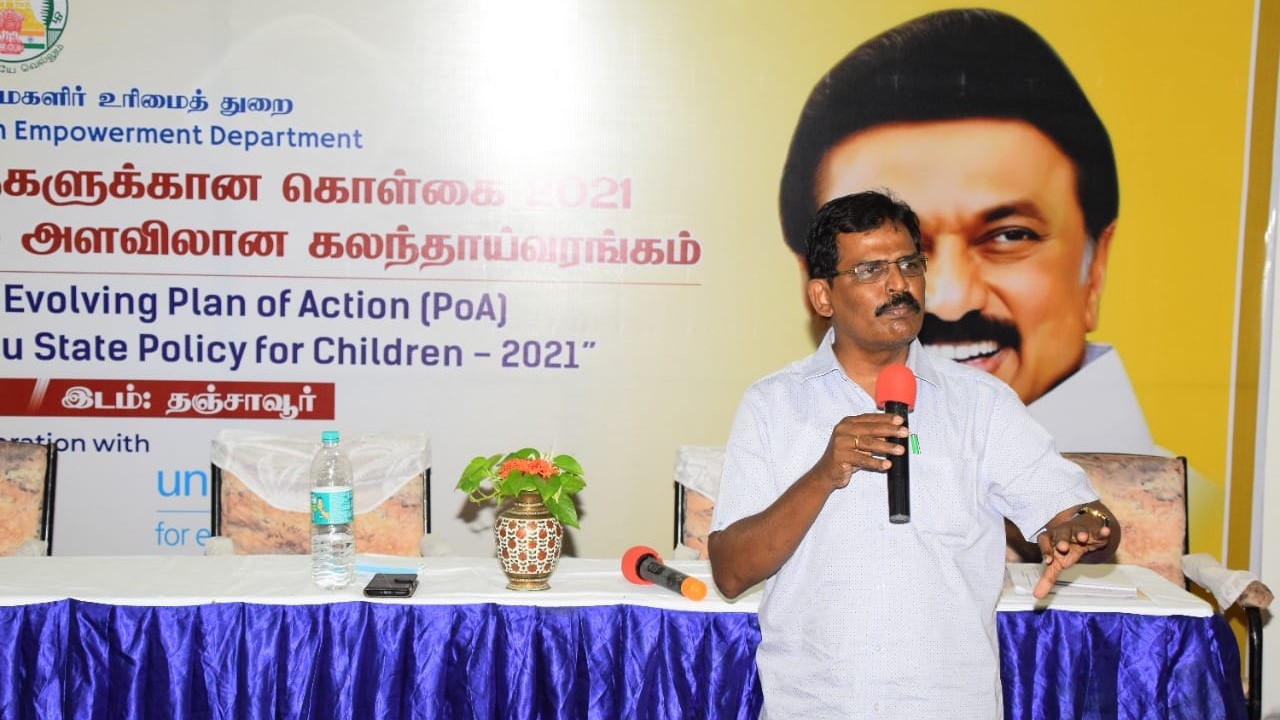State Plan of Action for Implementation of Tamil Nadu State Child Policy
Thozhamai played a crucial role in catalyzing the formulation of the Tamil Nadu policy for Children. Alongside the Department of Tamil Nadu Government, Thozhamai facilitated extensive discussions and consultations across the state to gather feedback and insights from various stakeholders. These inclusive engagements were aimed at ensuring that the policy development process was participatory and representative of the diverse perspectives and needs of children and communities throughout Tamil Nadu.
By traveling across the state and engaging with stakeholders such as community members, parents, educators, healthcare professionals, civil society organizations, and children themselves, Thozhamai and the Government of Tamil Nadu sought to foster an environment of collaboration and dialogue. Through these interactions, they were able to gather valuable input, identify key priorities, and address the specific challenges faced by children in different regions and contexts within the state.
The inclusive approach adopted by Thozhamai and the Government of Tamil Nadu reflects a commitment to democratic governance and the principle of leaving no one behind, ensuring that the voices of all stakeholders, especially children, are heard and considered in the formulation of policies that directly impact their lives. This collaborative effort helped to shape a more comprehensive and responsive policy framework that prioritizes the well-being, rights, and holistic development of children across Tamil Nadu.
Policy Suggestions for State Plan of Action
The State of Tamil Nadu is dedicated to ensuring equitable access to life, survival, health, and nutrition for all children. To achieve this, the state emphasizes investing in the first 1000 days of a child's life, addressing health disparities, and providing adequate nutrition. Key approaches include:
- Quality Healthcare: Ensuring universal access to child-friendly healthcare.
- Mental Health Programs: Implementing special care for children's mental health.
- Ante Natal Care: Providing universal access to quality care for pregnant women.
- Health Infrastructure: Strengthening primary health centers and sub-centers.
- Early Intervention: Linking Anganwadi centers with early intervention services.
- Community Participation: Involving Panchayats in monitoring primary health centers.
- Grievance Redressal: Establishing autonomous bodies for grievance redressal.
- Legal Enforcement: Enforcing laws on child protection and marriage.
- Budget Allocation: Increasing budgetary provisions for healthcare and nutrition.
Education
The state aims to provide quality education for all children, focusing on foundational literacy, safe school environments, and inclusive education. Key initiatives include:
- Safe Infrastructure: Ensuring safe and inclusive school facilities.
- Qualified Teachers: Recruiting trained teachers as per norms.
- Life Skills Education: Integrating life skills and gender equality in the curriculum.
- Special Needs Education: Providing inclusive education for children with disabilities.
- Community Engagement: Involving communities in preventing dropouts.
- Digital Education: Promoting inclusive digital education.
- Child Protection Policies: Introducing child protection policies in schools.
- Career Guidance: Offering career guidance and vocational training options.
Protection
The state commits to safeguarding children from all forms of violence, exploitation, and discrimination. Key actions include:
- Uniform Definitions: Defining the age of a child uniformly.
- Child Protection Policies: Introducing child protection policies in local bodies and schools.
- Community-Based Mechanisms: Strengthening village-level child protection committees.
- Awareness Campaigns: Conducting campaigns on child rights and protection.
- Zero Tolerance: Adopting zero tolerance towards violence against children.
- Complaints Committees: Establishing internal complaints committees in schools.
- Child-Friendly Judicial System: Ensuring a child-friendly judicial process.
- Data Management: Enhancing data management for monitoring child protection.
Participation
The state recognizes children's capacity to contribute and aims to promote their participation in decision-making processes. Key measures include:
- Child Participation Forums: Establishing children's councils and Bala Sabhas.
- Capacity Building: Training adults on child participation.
- Partnerships: Partnering with civil society organizations and academic institutions.
- Local Engagement: Strengthening local bodies and community organizations.
- Evidence-Based Programming: Developing evidence-based programs for children.
Conclusion
The State of Tamil Nadu is committed to implementing the State Child Policy through a holistic approach encompassing health, education, protection, and participation. With concerted efforts and multi-sectoral collaboration, the state aims to ensure the well-being and rights of all children.


